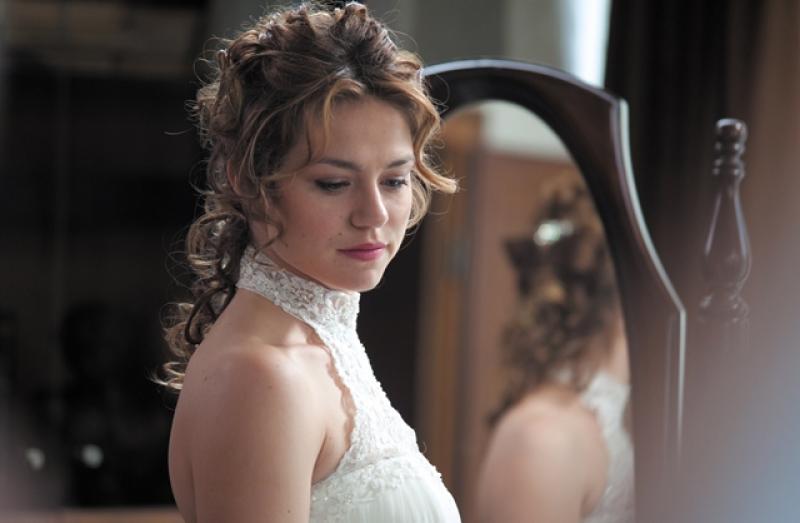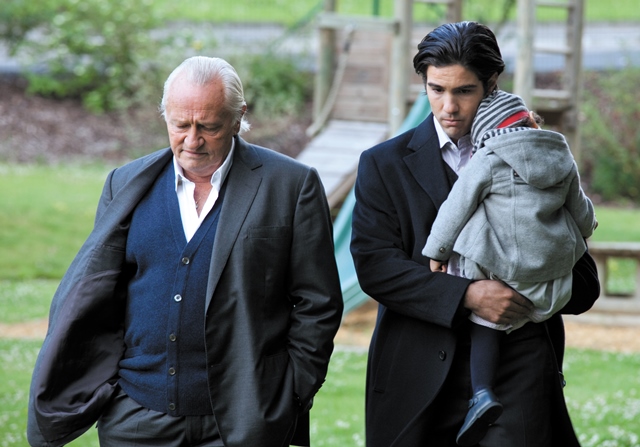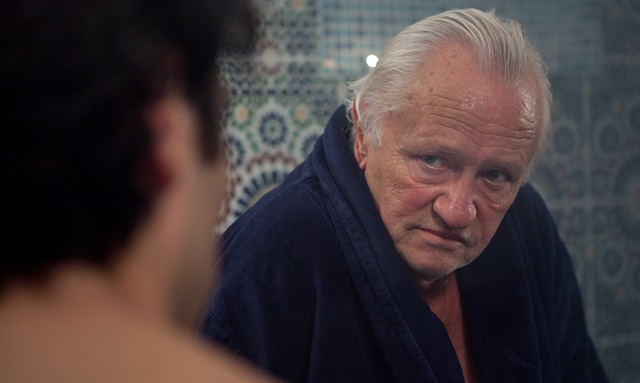Our Children | reviews, news & interviews
Our Children
Our Children
Distressing, yet ultimately unsatisfying, Belgian family drama inspired by shocking real-life events

It’s likely that how Our Children culminates is no secret. Director Joachim Lafosse is well aware of that, and the film’s opening moments take place in the aftermath of the shocking conclusion of what’s about to unfold. Nonetheless, Our Children is composed so carefully that its climax still whacks you in the stomach.
Our Children (Á perde la raison) reunites Tahar Rahim and Niels Arestrup, last seen together in Jacques Audiard’s A Prophet. Together with Émilie Dequenne, the trio comprise a family unit as unusual as it’s toxic. The film is based on real-life events that occurred in Belgium, Lafosse’s home country, in 2007. The director has said that for him they evoked Greek tragedy, and that he wanted to build on them to dig further into themes of excessive love, dysfunctional families and the nature of limits explored in his previous films.
 Mounir (Rahim) lives with his stepfather, Doctor André Pinget (Arestrup, pictured right with Tahar Rahim). Although born in Morocco and still having family there, Mounir has somehow come under Pinget’s wardship. The balance between the two is shaken when Mounir meets, falls in love with and marries teacher Murielle (Dequenne). When the couple tell Pinget their intentions, he offers to pay for their honeymoon and Murielle invites him along. They then move in with Pinget, and Mounir is employed by the aging doctor. Pinget takes Murielle on as a patient.
Mounir (Rahim) lives with his stepfather, Doctor André Pinget (Arestrup, pictured right with Tahar Rahim). Although born in Morocco and still having family there, Mounir has somehow come under Pinget’s wardship. The balance between the two is shaken when Mounir meets, falls in love with and marries teacher Murielle (Dequenne). When the couple tell Pinget their intentions, he offers to pay for their honeymoon and Murielle invites him along. They then move in with Pinget, and Mounir is employed by the aging doctor. Pinget takes Murielle on as a patient.
This close trio is expanded when a first child is born, then another, a third and finally a fourth. All are girls. Murielle is just 27. Space is needed and Mounir and Murielle’s relationship is falling apart. He hits her. Pinget acquires a new house, its ownership subject to a legal document signed by Mounir and Pinget. Murielle is not a signatory. Her mental state is in decline and she’s seeing a therapist chosen by Pinget, who’s appalled to discover that her client lives in the house of a man who is not only her doctor, but also effectively her father-in-law. It’s also revealed that Pinget has a marriage of convenience to Mounir’s Morocco-dwelling mother. Pinget is also behind a similar marriage, between Murielle’s sister and Mounir’s brother. After the birth of their third child, Mounir tells Murielle that “this is still his [Pinget’s] home, remember.” As if she could forget it.
The slow-burn impact of the pressure-cooker atmosphere on Murielle is depicted deftly, with a fine sense of pace. It’s only between the birth of daughters two and three that Lafosse begins filling the picture in. Before then, this seems a happy, if unconventional, household with a generous yet terse father figure on hand. After that, Mounir lashes out at the kids and no comment is made by Pinget. But Pinget has no problem saying what he likes to Murielle. Her deterioration is tough to watch, echoing Catherine Deneuve’s in Repulsion. This is Émilie Dequenne’s film.
 As the manipulative Pinget, Arestrup exudes a creepy and detached air of threat. Rahim though is curiously colourless, his subservience to Pinget painted in broad stokes. Despite the somewhat lumpy revisit to Arestrup and Rahim's figurative father-son relationship from A Prophet, both characterisations are devices enabling Lafosse to perform his principal task, which is to render Murielle’s plight in detail.
As the manipulative Pinget, Arestrup exudes a creepy and detached air of threat. Rahim though is curiously colourless, his subservience to Pinget painted in broad stokes. Despite the somewhat lumpy revisit to Arestrup and Rahim's figurative father-son relationship from A Prophet, both characterisations are devices enabling Lafosse to perform his principal task, which is to render Murielle’s plight in detail.
More problematic is Lafosse’s almost-constant stylistic device of having the right or left of the frame masked by an impression of something out-of-focus in the foreground – a door frame, head or curtain – to give a sense that the camera is peeking in unseen on the characters, as if through a window (as seen in picture of Niels Arestrup, above left). Once registered, this distracting contrivance quickly wears out its welcome.
The tension in Our Children is palpable, the use of music outstanding, the climax shocking and Émilie Dequenne stunning as Murielle. But this ultimately unsatisfying film does not gel to become more than the sum of its parts.
Watch the trailer for Our Children
rating
Explore topics
Share this article
The future of Arts Journalism
You can stop theartsdesk.com closing!
We urgently need financing to survive. Our fundraising drive has thus far raised £49,000 but we need to reach £100,000 or we will be forced to close. Please contribute here: https://gofund.me/c3f6033d
And if you can forward this information to anyone who might assist, we’d be grateful.

Subscribe to theartsdesk.com
Thank you for continuing to read our work on theartsdesk.com. For unlimited access to every article in its entirety, including our archive of more than 15,000 pieces, we're asking for £5 per month or £40 per year. We feel it's a very good deal, and hope you do too.
To take a subscription now simply click here.
And if you're looking for that extra gift for a friend or family member, why not treat them to a theartsdesk.com gift subscription?
more Film
 The Perfect Neighbor, Netflix review - Florida found-footage documentary is a harrowing watch
Sundance winner chronicles a death that should have been prevented
The Perfect Neighbor, Netflix review - Florida found-footage documentary is a harrowing watch
Sundance winner chronicles a death that should have been prevented
 Blu-ray: Le Quai des Brumes
Love twinkles in the gloom of Marcel Carné’s fogbound French poetic realist classic
Blu-ray: Le Quai des Brumes
Love twinkles in the gloom of Marcel Carné’s fogbound French poetic realist classic
 Frankenstein review - the Prometheus of the charnel house
Guillermo del Toro is fitfully inspired, but often lost in long-held ambitions
Frankenstein review - the Prometheus of the charnel house
Guillermo del Toro is fitfully inspired, but often lost in long-held ambitions
 London Film Festival 2025 - a Korean masterclass in black comedy and a Camus classic effectively realised
New films from Park Chan-wook, Gianfranco Rosi, François Ozon, Ildikó Enyedi and more
London Film Festival 2025 - a Korean masterclass in black comedy and a Camus classic effectively realised
New films from Park Chan-wook, Gianfranco Rosi, François Ozon, Ildikó Enyedi and more
 After the Hunt review - muddled #MeToo provocation
Julia Roberts excels despite misfiring drama
After the Hunt review - muddled #MeToo provocation
Julia Roberts excels despite misfiring drama
 London Film Festival 2025 - Bradley Cooper channels John Bishop, the Boss goes to Nebraska, and a French pandemic
... not to mention Kristen Stewart's directing debut and a punchy prison drama
London Film Festival 2025 - Bradley Cooper channels John Bishop, the Boss goes to Nebraska, and a French pandemic
... not to mention Kristen Stewart's directing debut and a punchy prison drama
 Ballad of a Small Player review - Colin Farrell's all in as a gambler down on his luck
Conclave director Edward Berger swaps the Vatican for Asia's sin city
Ballad of a Small Player review - Colin Farrell's all in as a gambler down on his luck
Conclave director Edward Berger swaps the Vatican for Asia's sin city
 London Film Festival 2025 - from paranoia in Brazil and Iran, to light relief in New York and Tuscany
'Jay Kelly' disappoints, 'It Was Just an Accident' doesn't
London Film Festival 2025 - from paranoia in Brazil and Iran, to light relief in New York and Tuscany
'Jay Kelly' disappoints, 'It Was Just an Accident' doesn't
 Iron Ladies review - working-class heroines of the Miners' Strike
Documentary salutes the staunch women who fought Thatcher's pit closures
Iron Ladies review - working-class heroines of the Miners' Strike
Documentary salutes the staunch women who fought Thatcher's pit closures
 Blu-ray: The Man in the White Suit
Ealing Studios' prescient black comedy, as sharp as ever
Blu-ray: The Man in the White Suit
Ealing Studios' prescient black comedy, as sharp as ever
 The Woman in Cabin 10 review - Scandi noir meets Agatha Christie on a superyacht
Reason goes overboard on a seagoing mystery thriller
The Woman in Cabin 10 review - Scandi noir meets Agatha Christie on a superyacht
Reason goes overboard on a seagoing mystery thriller
 London Film Festival 2025 - crime, punishment, pop stars and shrinks
Daniel Craig investigates, Jodie Foster speaks French and Colin Farrell has a gambling habit
London Film Festival 2025 - crime, punishment, pop stars and shrinks
Daniel Craig investigates, Jodie Foster speaks French and Colin Farrell has a gambling habit

Add comment